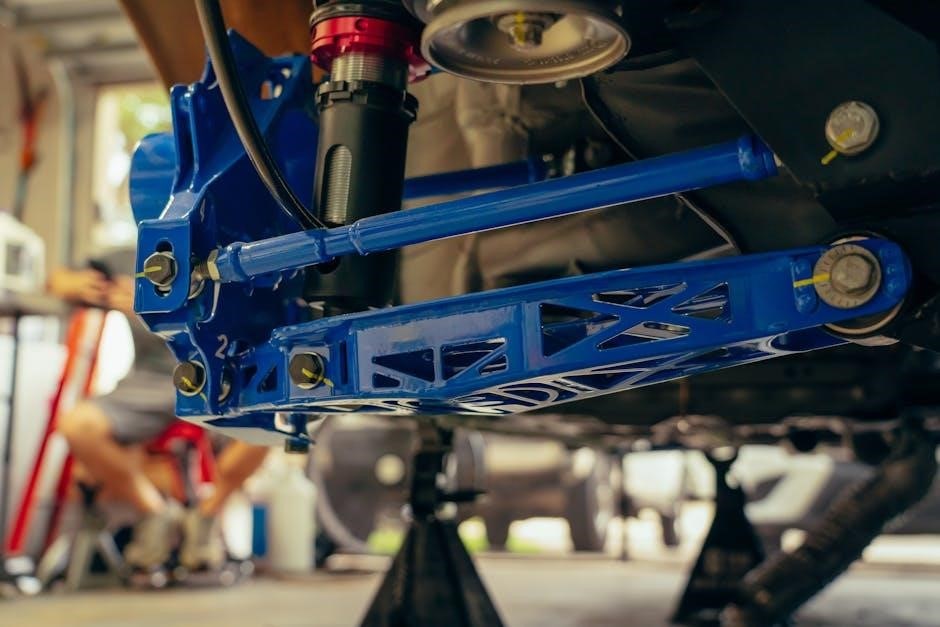Mechanical aptitude tests assess a candidate’s ability to understand and apply mechanical principles, crucial for roles in manufacturing, engineering, and technical fields. These exams evaluate problem-solving skills, knowledge of tools, and machinery operation, ensuring candidates can handle real-world challenges. Popular resources like mechanical aptitude questions and answers PDFs provide valuable study materials, helping individuals prepare effectively for such assessments.
What Are Mechanical Aptitude Tests?
Mechanical aptitude tests are standardized assessments designed to evaluate a candidate’s ability to understand and apply mechanical principles. These tests measure knowledge of tools, machinery, and problem-solving skills, often used in hiring for technical roles. They typically include questions on physics, mechanical systems, and logical reasoning. Resources like mechanical aptitude questions and answers PDFs provide practice materials, helping candidates prepare for exams and improve their understanding of mechanical concepts. These tests are essential for roles requiring hands-on technical skills and problem-solving abilities.
Importance of Mechanical Aptitude Tests in Hiring
Mechanical aptitude tests are crucial for hiring in technical roles, as they assess a candidate’s problem-solving skills and understanding of mechanical principles. Employers use these tests to identify individuals capable of handling machinery, tools, and complex systems. By evaluating mechanical knowledge and reasoning abilities, these exams ensure candidates are well-suited for roles in manufacturing, engineering, and maintenance. They provide a reliable measure of mechanical proficiency, helping employers make informed decisions and ensure workplace safety and efficiency.

Understanding Mechanical Aptitude Questions
Mechanical aptitude questions assess problem-solving skills and understanding of mechanical principles, tools, and machinery. They evaluate a candidate’s ability to apply knowledge in practical scenarios, ensuring technical proficiency;
Types of Questions in Mechanical Aptitude Tests
Mechanical aptitude tests feature diverse question types, including multiple-choice, true/false, and problem-solving scenarios. Questions often involve mechanical reasoning, electrical circuits, and material properties. They may ask candidates to identify tools, understand gear systems, or calculate forces in levers. Some questions require interpreting diagrams or applying physics principles to real-world problems; The tests also include topics like fluid mechanics and dynamics, ensuring a comprehensive assessment of mechanical knowledge and problem-solving abilities. These questions are designed to evaluate both theoretical understanding and practical application skills.
Key Concepts Tested in Mechanical Aptitude Exams
Mechanical aptitude exams evaluate core mechanical principles, including levers, gears, and pulleys. They test understanding of forces, motion, and energy transfer. Problem-solving techniques, such as calculating torque or determining gear ratios, are emphasized. Candidates must apply knowledge of tools, materials, and electrical systems. The exams also assess the ability to interpret diagrams and apply physics principles to practical scenarios. These concepts are essential for roles requiring mechanical reasoning and hands-on problem-solving skills in technical environments. Mastery of these areas ensures readiness for real-world challenges.
Common Challenges in Mechanical Aptitude Questions
Mechanical aptitude questions often pose challenges due to complex diagrams and time constraints. Candidates must quickly interpret mechanical systems and apply physics principles. Difficulties arise in calculating forces, torque, and gear ratios under pressure. Additionally, questions may require understanding multiple principles simultaneously, such as combining electrical and mechanical concepts. Visualizing spatial relationships and troubleshooting mechanical issues also prove challenging for many test-takers. These aspects demand strong problem-solving skills and practical knowledge to overcome effectively and achieve success in the exam.

Preparing for Mechanical Aptitude Tests
Preparing for mechanical aptitude tests requires studying relevant materials and practicing sample questions to enhance understanding and improve problem-solving skills effectively.
Study Materials and Resources
For effective preparation, utilize study materials like mechanical aptitude questions and answers PDF, which offer comprehensive practice tests and detailed explanations. Recommended books, such as Mechanical Aptitude Tests and Preparing for Mechanical Comprehension Tests, provide in-depth insights. Online platforms like JobTestPrep and iPREP offer free practice tests and video guides. Additionally, free PDF downloads and online courses are readily available, covering topics from basic principles to advanced problem-solving strategies, ensuring thorough preparation for mechanical aptitude exams.
Practice Tests and Workbooks
Enhance your preparation with practice tests and workbooks designed to simulate real exam conditions. Websites like JobTestPrep and iPREP offer free mechanical aptitude sample questions with detailed explanations. Workbooks such as Mechanical Aptitude Tests provide a structured approach to mastering key concepts. These resources cover topics like mechanical comprehension, electrical circuits, and problem-solving strategies. Regular practice with these materials helps improve speed, accuracy, and confidence, ensuring you’re well-prepared for the actual test.
Time Management Strategies
Effective time management is critical for success in mechanical aptitude tests. Allocate a set amount of time to each question, avoiding overthinking. Prioritize questions you’re confident about and return to challenging ones later. Practice tests help you refine your pacing and ensure you complete the exam within the allotted time. Regular practice builds speed and accuracy, allowing you to tackle problems efficiently under pressure.
Use elimination techniques to quickly narrow down options and make educated guesses when necessary. This approach maximizes your score while managing time effectively.

Mechanical Comprehension and Problem Solving
Mechanical comprehension tests evaluate understanding of mechanical principles and problem-solving skills. Candidates must apply knowledge to real-world scenarios, demonstrating the ability to analyze and resolve mechanical challenges effectively.
Understanding Mechanical Systems
Understanding mechanical systems involves analyzing how components like gears, pulleys, and levers interact to perform tasks. Mechanical aptitude tests often assess this knowledge, requiring candidates to visualize and predict system behavior. Key concepts include torque, friction, and energy transfer. Familiarity with tools and machinery operations is essential, as these systems are fundamental in manufacturing and engineering roles. By studying mechanical systems, individuals can better solve problems and optimize performance in real-world applications. This knowledge is critical for technical positions and is frequently tested in aptitude exams.
Applying Physics Principles
Applying physics principles is central to mechanical aptitude tests, as they often involve concepts like force, motion, and energy. Understanding how these principles influence mechanical systems is crucial for problem-solving. For instance, torque and pressure calculations rely on foundational physics. Practice tests and resources, such as mechanical aptitude questions and answers PDFs, emphasize these concepts. Mastery of physics principles enhances one’s ability to analyze and predict the behavior of mechanical systems, a key skill for engineering and technical roles.
Logical Reasoning in Mechanical Contexts
Logical reasoning in mechanical contexts involves analyzing systems and components to deduce their behavior and functionality. It requires applying mechanical knowledge to solve problems systematically. For example, identifying how gears interact or determining the most efficient material for a specific application. Mechanical aptitude questions and answers PDFs often include scenarios that test this skill, helping candidates refine their ability to think critically and make informed decisions in technical situations. This skill is essential for troubleshooting and optimizing mechanical systems effectively.

Tools and Machinery
Mechanical aptitude questions and answers PDFs often include sections on identifying and understanding tools like wrenches, drills, and saws, and their applications in machinery operations. These resources help candidates prepare by explaining tool functions and machinery mechanisms, ensuring they can solve problems involving equipment usage and maintenance effectively.
Identifying and Using Basic Tools
Mechanical aptitude questions and answers PDFs frequently cover the identification and proper use of basic tools like wrenches, screwdrivers, and hammers. These tools are essential for solving mechanical problems and operating machinery. Understanding their functions and applications is critical for success in technical roles. Practice materials often include diagrams and scenarios to test candidates’ ability to select the right tool for specific tasks, ensuring they can apply practical knowledge effectively in real-world mechanical environments.
Understanding Machinery Operations
Mechanical aptitude questions and answers PDFs often focus on machinery operations, testing candidates’ knowledge of how machines function and interact. These resources typically cover principles such as levers, gears, and pulleys, essential for understanding mechanical systems. Practice materials include scenarios where candidates must analyze machinery components and predict their behavior under different conditions. This helps assess their ability to troubleshoot and optimize machinery, crucial skills for roles in manufacturing and engineering.
Troubleshooting Common Mechanical Issues
Mechanical aptitude questions and answers PDFs frequently address troubleshooting scenarios, evaluating a candidate’s ability to identify and solve mechanical problems. These resources often include case studies of faulty machinery, requiring the test-taker to apply knowledge of gears, motors, and fluid dynamics to diagnose issues. Practice materials emphasize logical reasoning and practical problem-solving skills, ensuring candidates can effectively address common mechanical challenges in real-world industrial settings.

Electrical and Hydraulic Systems
Electrical and hydraulic systems are fundamental in mechanical aptitude tests, assessing understanding of circuits, fluid dynamics, and their applications in machinery. Resources like PDF guides provide comprehensive study materials.
Basics of Electrical Circuits
Understanding electrical circuits is essential for mechanical aptitude tests. These circuits involve components like resistors, capacitors, and inductors, governed by principles such as Ohm’s Law. Basic concepts include voltage, current, and resistance, as well as circuit types like series and parallel configurations. Knowledge of circuit analysis and safety practices is also critical. Mechanical aptitude questions often test these fundamentals, requiring candidates to apply theoretical understanding to practical problems. Resources like PDF guides and practice tests provide detailed explanations and exercises to master these concepts effectively.
Hydraulic Systems Fundamentals
Hydraulic systems use pressurized fluids to transmit energy and perform tasks. Key components include pumps, cylinders, and valves, which control fluid flow and pressure. Understanding Pascal’s Law is crucial, as it explains how force is distributed. These systems are efficient in heavy machinery and robotics. Mechanical aptitude tests often include questions on fluid dynamics, pressure systems, and system efficiency. PDF resources and practice tests provide detailed explanations and exercises, helping candidates grasp these principles and apply them to real-world scenarios effectively.
Interactions Between Electrical and Mechanical Components
Interactions between electrical and mechanical components are vital in modern machinery, where electrical systems power and control mechanical movements. Motors convert electrical energy into mechanical energy, while sensors detect mechanical changes and send electrical signals. These systems are essential for automation and precise control. Understanding these interactions is critical in mechanical aptitude tests, as questions often involve analyzing how electrical signals and currents influence mechanical outputs. Practice materials, such as mechanical aptitude questions and answers PDFs, provide exercises to master these concepts and their practical applications.

Materials and Properties
Understanding materials and their properties is essential in mechanical aptitude tests, as it involves identifying strengths, weaknesses, and suitability for specific applications. Common materials like metals, plastics, and composites are often tested, focusing on their durability, conductivity, and resistance to stress. Mechanical aptitude questions and answers PDFs provide exercises to assess knowledge of material properties and their practical uses in engineering and manufacturing scenarios.
Common Materials Used in Mechanics
In mechanics, common materials include metals like steel, aluminum, and copper, known for their strength and conductivity. Plastics and composites are also widely used due to their lightweight and durability. Understanding these materials’ properties, such as tensile strength, elasticity, and thermal resistance, is crucial for problem-solving in mechanical systems. Mechanical aptitude questions and answers PDFs often include exercises on identifying and selecting appropriate materials for specific applications, ensuring practical knowledge for real-world engineering scenarios.
Understanding Material Strengths and Weaknesses
Understanding material strengths and weaknesses is critical in mechanics, as it determines their suitability for specific applications. Metals like steel and aluminum are praised for their durability and versatility, while plastics and composites offer lightweight and corrosion resistance. Each material’s properties, such as tensile strength, elasticity, and thermal conductivity, must be analyzed to ensure optimal performance. Mechanical aptitude questions and answers PDFs often include exercises on identifying materials’ limitations and strengths, enhancing problem-solving skills in engineering contexts.
Material Selection for Specific Applications
Material selection is vital for ensuring mechanical systems perform optimally. Factors like load, environment, and cost guide choices. For example, stainless steel is ideal for corrosive environments, while titanium excels in high-strength, low-weight scenarios. Mechanical aptitude tests often include questions on matching materials to applications, testing knowledge of their properties. Resources like PDF guides provide exercises to refine this skill, helping candidates understand how material characteristics influence design and functionality in real-world engineering challenges.

Problem-Solving Strategies
Problem-solving strategies are essential for tackling mechanical aptitude tests. They involve logical reasoning, understanding principles, and applying practical knowledge to real-world scenarios effectively, addressing common challenges systematically.
Approach to Solving Mechanical Problems
When solving mechanical problems, start by understanding the question thoroughly. Break down complex scenarios into manageable parts, identifying key components and relationships. Apply fundamental principles like physics and mechanics to analyze the situation. Use diagrams or visual aids to clarify concepts and visualize interactions. Practice with sample questions from resources like mechanical aptitude questions and answers PDFs to refine your strategy. This systematic approach enhances problem-solving efficiency and accuracy in mechanical aptitude tests.
Using Diagrams and Visual Aids
Diagrams and visual aids are essential tools for solving mechanical problems, as they simplify complex concepts into clear, actionable visuals. They help candidates interpret relationships between components, identify forces, and understand system interactions. Many mechanical aptitude questions and answers PDFs include detailed diagrams to illustrate scenarios, allowing for better analysis and problem-solving. Practicing with these resources enhances spatial reasoning and the ability to apply theoretical knowledge to practical, visual-based challenges.
Elimination Techniques for Multiple-Choice Questions
Elimination techniques are valuable strategies for tackling multiple-choice questions in mechanical aptitude tests; By systematically identifying and removing incorrect options, candidates can increase their chances of selecting the right answer. Many mechanical aptitude questions and answers PDFs provide examples where eliminating implausible choices narrows down the options, even when the correct solution isn’t immediately apparent. This method reduces guesswork and boosts confidence, especially under time constraints.

Safety Protocols and Best Practices
Safety protocols are essential in mechanical environments to prevent accidents. Best practices include using protective equipment, following guidelines, and maintaining awareness of potential hazards, ensuring a safer workplace.
Importance of Safety in Mechanical Work
Safety is crucial in mechanical work to prevent injuries and equipment damage. Adhering to safety protocols ensures a secure environment, reducing risks and enhancing productivity. Proper use of protective gear, regular maintenance, and following guidelines are essential. Neglecting safety can lead to severe incidents, making it a priority in mechanical aptitude assessments. Understanding safety principles is vital for candidates, as it reflects their ability to work responsibly and efficiently in real-world scenarios.
Common Safety Hazards in Mechanical Environments
Mechanical environments often pose hazards like moving parts, sharp edges, and electrical risks. Improper tool usage, inadequate training, and equipment malfunctions can lead to injuries. Additionally, poor lighting, slippery surfaces, and chemical exposure increase accident risks. Regular inspections, proper training, and adherence to safety protocols are essential to mitigate these dangers. Addressing these hazards ensures a safer workplace, reducing the likelihood of incidents and fostering a culture of safety awareness among workers.
Best Practices for Safe Tool Usage
Safe tool usage begins with selecting the right tool for the job, ensuring proper fit and function. Always wear personal protective equipment, such as gloves and safety glasses, to prevent injuries. Inspect tools before use for damage or wear, and adhere to manufacturer guidelines. Regular maintenance and proper storage in designated areas are critical. Training employees on correct handling and usage techniques minimizes risks. Following these practices reduces accidents, enhances efficiency, and promotes a safer working environment.

Fluid Mechanics and Dynamics
Fluid mechanics involves the study of liquids and gases under various forces, while dynamics examines motion and forces in mechanical systems. Understanding these principles is essential for solving real-world engineering problems, such as fluid flow and pressure calculations.
Basic Principles of Fluid Mechanics
Fluid mechanics involves the study of fluids (liquids and gases) under various forces, such as pressure, velocity, and energy transfer. Key principles include Bernoulli’s equation, Pascal’s law, and the concept of viscosity. These principles help analyze fluid flow, pressure distribution, and energy loss in systems. Understanding these fundamentals is crucial for solving mechanical aptitude questions related to fluid dynamics, hydraulics, and pneumatics. Practice materials, such as mechanical aptitude questions and answers PDFs, often include problems that test these foundational concepts.
Understanding Dynamics in Mechanical Systems
Dynamics in mechanical systems involves studying motion and the forces that cause it, encompassing concepts like velocity, acceleration, torque, and Newton’s laws of motion. This understanding is crucial for predicting how mechanical components behave under different conditions, essential for machinery design and maintenance. Engineers apply dynamics to ensure efficient and safe machine operation. Mechanical aptitude tests often include questions that require the application of these principles. Study materials, such as mechanical aptitude questions and answers PDFs, are valuable resources for preparation.
Applications of Fluid Mechanics in Real-World Scenarios
Fluid mechanics is essential in designing hydraulic systems, pipelines, and pumps, ensuring efficient fluid flow and pressure management. It is applied in aerospace engineering for aerodynamics and in civil engineering for water supply systems. Understanding fluid mechanics aids in troubleshooting issues like leakage or pressure drops. Mechanical aptitude tests often include questions on fluid dynamics, making it a critical area of study for candidates preparing for technical roles. Real-world applications highlight its importance in maintaining and optimizing mechanical systems.
Resources for Further Learning
Recommended books, online courses, and PDF guides provide comprehensive study materials for mechanical aptitude. Join online communities and forums for additional support and discussion to enhance your preparation and understanding.
Recommended Books and PDF Guides
Several books and PDF guides are available to help prepare for mechanical aptitude tests. Titles like Mechanical Aptitude Tests and Bennett Mechanical Aptitude Test Guide offer detailed explanations and practice questions. Free PDF resources, such as those from JobTestPrep and iPREP, provide sample questions and video guides. These materials cover topics like mechanical reasoning, electrical circuits, and problem-solving strategies. They are ideal for self-study and ensures a thorough understanding of key concepts. Utilize these resources to enhance your preparation and improve test performance effectively.
Online Courses and Tutorials
Online courses and tutorials are excellent resources for mastering mechanical aptitude tests. Platforms like JobTestPrep and iPREP offer comprehensive practice tests, video guides, and interactive lessons. These courses cover essential topics such as mechanical reasoning, electrical circuits, and problem-solving strategies. They provide structured study plans and expert instruction to help candidates improve their skills. Many courses include real-world applications and detailed explanations, ensuring a thorough understanding of mechanical concepts. These tools are ideal for self-paced learning and can significantly enhance test preparation.
Communities and Forums for Mechanical Aptitude
Engaging with online communities and forums can provide valuable insights and support for mechanical aptitude test preparation. Platforms like Reddit and specialized engineering forums offer spaces to discuss challenges, share resources, and learn from experienced professionals. These communities often feature threads with mechanical aptitude questions and answers, PDF guides, and personal tips for success. Participating in such forums fosters collaboration and can help candidates stay updated on industry trends and testing strategies, enhancing their overall readiness for mechanical aptitude assessments.
Mastering mechanical aptitude requires consistent practice and a deep understanding of core principles. Utilize resources like PDF guides and online forums to stay prepared and informed.
Summarizing Key Takeaways
Mechanical aptitude tests are essential for evaluating problem-solving and mechanical understanding. Practicing with resources like PDF guides and online tests improves comprehension. Focus on mastering principles such as physics, tools, and safety protocols. Regular practice with sample questions enhances confidence and familiarity with exam formats. Utilize communities and forums for additional insights and support. Combining theoretical knowledge with practical application ensures success in these assessments, making it crucial for candidates to stay updated and well-prepared.
Final Preparation Tips
Focus on timed practice tests to simulate exam conditions and improve speed. Review mistakes to identify weak areas for targeted improvement. Stay calm and manage stress to enhance focus during the test. Ensure a solid understanding of mechanical principles, tools, and safety protocols. Utilize online resources and PDF guides for last-minute revisions. Prioritize quality rest and mental preparation to maintain peak performance. Confidence and thorough preparation are key to excelling in mechanical aptitude assessments.
Staying Updated with Industry Developments
Continuous learning is essential to excel in mechanical aptitude tests. Stay informed about advancements in tools, machinery, and techniques by subscribing to industry publications. Engage with online forums and communities to discuss emerging trends. Regularly review updated mechanical aptitude questions and answers PDFs to familiarize yourself with new concepts. Participate in workshops and webinars to gain hands-on experience. Following industry leaders and educational platforms on social media can also provide valuable insights and resources for staying current.



0 Comments